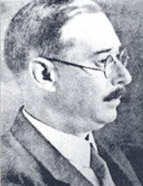

One would not be too amiss , although JC ’ s study is a work in progress , to read the opera omnia , even the philosophical one, of the author of António de Gouveia when he sees himself as ‘ only a modest historian of philosophy and a passionate lover of the history of Portuguese culture ’ , in the light of the historiographical diligence whose programme he set out, since ‘ the historical study of the evolution of ideas in Portugal is, so to speak, at a preliminary stage ’ . The plan exposed the intimate aporia of the ‘qualitatively superior nature’ of the cultural fact which, like any historical fact, is not only irreducible to identity, given its uniqueness and irreversible singularity, but because it implies a theoretical grid that is ‘extremely difficult to determine’, given the ‘web of symbolic abstractions’ that it raises (cf. Idem , V, pp.298-99). It was urgent, as he would materialise in his writing, to set out on a ‘patient and lucid hunt for facts’ ( Idem , I, p.337). The historian of ideas’ task, in response to the logical need for the historical investigation of philosophy, would be to erect an ‘object such that it becomes scientifically possible, i.e . , that it cannot be confused with a mere discontinuous and individualised exposition of the opinions of isolated thinkers’ ( Idem , II, p.221), in which case it would become a ‘cemetery of the individuality of philosophers’ ( Idem , I, p.467). This, he says in 1952, would only be the preliminary or instrumental operation , ‘markedly biographical, bibliographical and sometimes philological’.
The second operation would enhance the ‘ability to rethink thought’, especially ‘to grasp its original features and establish its correlations and meaning’, ‘because there is no History of Philosophy where there is no historicization of philosophical thought’, a task that Aristotle ( Metaphysics ) and Hegel ( Phänomenologie des Geistes [Phenomenology of the Spirit] , Vorlesungen über die Philosophie der Weltgeschichte [Lectures on the Philosophy of World History] ) made unyielding ( Idem , VIII, pp. 237-38). No wonder that, by dismissing analytical atomism and choosing the dialogue of philosophy with cultural and scientific syntaxes in diachrony, he can accurately claim to be the first great historian of ideas among us (‘Joaquim de Carvalho and History’, Homenagem ao Doutor Joaquim de Carvalho no 1.º Centenário do seu nascimento [Tribute to Doctor Joaquim de Carvalho on the 1 st centenary of his birth] , Boletim da Biblioteca da Universidade de Coimbra [Bulletin of the Library of the University of Coimbra] , 42 nd , 1994). It is eidetics that attests to the neo-Kantian unity, Weltanschauung , mundividência [Worldv iew] (his neologism) that encompasses the entire work. Philosophy uses only one of the possible languages of thought that the historian tries to grasp in its global historicity. But it is a vision of the world that goes within that language: ‘I believe that it is in the changes that take place in the living real man’, he wrote in 1932, emphasising the second ‘real’, objective, movement of the Hegelian symphony of the Spiritus , ‘and not in the relationships between concepts of abstract thought that we must look for the evolution of general conceptions that guide conduct’ ( OC , V, p.299).
This work is financed by national funds through FCT - Foundation for Science and Technology, I.P, in the scope of the projects UIDB/04311/2020 and UIDP/04311/2020.
